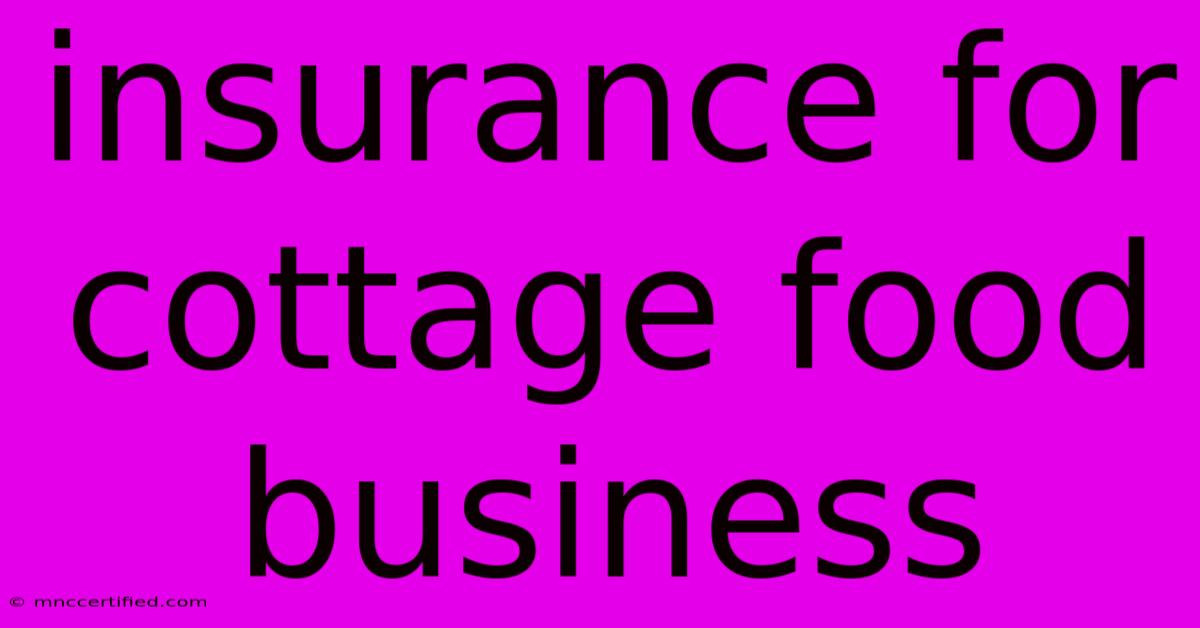Insurance For Cottage Food Business

Table of Contents
Insurance for Cottage Food Businesses: A Comprehensive Guide
Starting a cottage food business is exciting, but it's crucial to understand the risks involved. Protecting your hard work and financial investment requires the right insurance coverage. This comprehensive guide explores the essential insurance policies for cottage food businesses, helping you navigate the complexities and make informed decisions.
Understanding the Risks of a Cottage Food Business
Before diving into specific insurance types, it's vital to recognize the potential liabilities associated with operating a cottage food business. These risks can range from minor incidents to significant legal battles, impacting your finances and reputation. Common risks include:
- Foodborne illnesses: Even with stringent hygiene practices, the risk of foodborne illnesses remains. A customer falling ill due to your product can lead to significant legal and financial repercussions.
- Product liability: This covers claims arising from injuries or illnesses caused by your food products, including faulty packaging or incorrect labeling.
- Property damage: Accidents can happen in your home kitchen. Damage to your property or equipment could halt your operations and incur repair costs.
- Personal liability: If someone gets injured on your property during a pickup or delivery, you could face personal liability claims.
Essential Insurance Policies for Cottage Food Businesses
Choosing the right insurance is paramount. Here are the key policies to consider:
1. Product Liability Insurance: A Must-Have
This is arguably the most crucial insurance for any cottage food business. Product liability insurance protects you against financial losses resulting from bodily injury or property damage caused by your food products. It covers legal fees, settlements, and judgments arising from claims related to your products. The coverage amount should be sufficient to cover potential legal costs and compensation payouts.
2. General Liability Insurance: Broad Protection
General liability insurance protects your business from claims arising from accidents or injuries on your property, advertising injury (like libel or slander), and property damage you cause to others. For example, if a customer slips and falls while picking up an order, general liability would help cover medical expenses and legal costs.
3. Business Property Insurance: Protecting Your Assets
While your homeowner's insurance might offer some coverage, business property insurance provides specialized protection for your business equipment, inventory, and supplies. This covers losses due to fire, theft, or other unforeseen events that could disrupt your operations.
4. Commercial Auto Insurance (if applicable): Covering Transportation
If you deliver your products, commercial auto insurance is essential. This protects you against accidents involving your vehicle during business operations. It's crucial to distinguish between personal and commercial use to ensure adequate coverage.
Factors Affecting Insurance Costs
Several factors influence the cost of insurance for your cottage food business:
- Location: Insurance rates vary geographically based on risk factors.
- Type of food products: Producing high-risk foods (e.g., those requiring refrigeration) may lead to higher premiums.
- Sales volume: Higher sales volume often correlates with higher risk and potentially higher premiums.
- Safety record: A history of accidents or claims might increase your rates.
Finding the Right Insurance Provider
Finding the right insurance provider involves comparing quotes from multiple insurers. Look for insurers specializing in small businesses or food businesses. Don't solely focus on price; ensure the policy adequately covers your specific risks and needs. Consider asking for referrals from other cottage food entrepreneurs.
Staying Compliant: Local Regulations and Licensing
Remember, insurance is just one piece of the puzzle. Thoroughly research and comply with all local, state, and federal regulations regarding cottage food operations. Licensing requirements vary significantly by location, so understanding your specific requirements is crucial for legal operation.
Conclusion: Protect Your Cottage Food Business
Investing in appropriate insurance is a crucial step in protecting your cottage food business from potential financial and legal issues. By understanding the risks and securing adequate coverage, you can focus on growing your business with peace of mind. Remember to regularly review your insurance policies to ensure they remain aligned with your business's evolving needs. Don't hesitate to consult with an insurance professional for personalized advice.

Thank you for visiting our website wich cover about Insurance For Cottage Food Business. We hope the information provided has been useful to you. Feel free to contact us if you have any questions or need further assistance. See you next time and dont miss to bookmark.
Featured Posts
-
Commercial Truck Insurance Maryland
Nov 14, 2024
-
Olivia Munn Barely Knew John Mulaney During Pregnancy
Nov 14, 2024
-
Watch The Mad About The Boy Trailer
Nov 14, 2024
-
Gaetz To Lead Justice Department Trumps Choice
Nov 14, 2024
-
Color The Hydrogen Bonds Between A And T Black
Nov 14, 2024